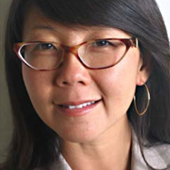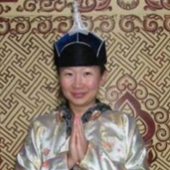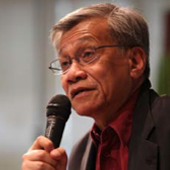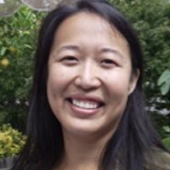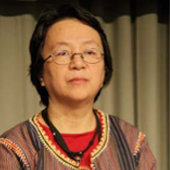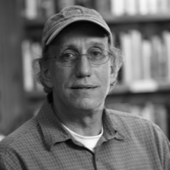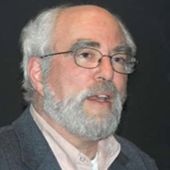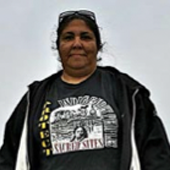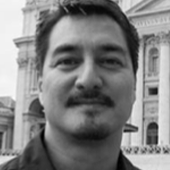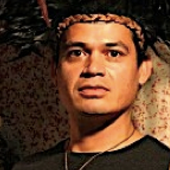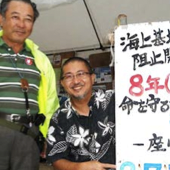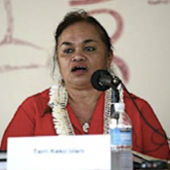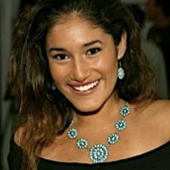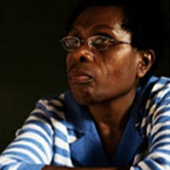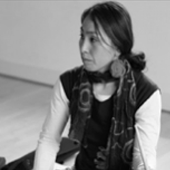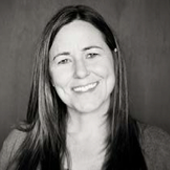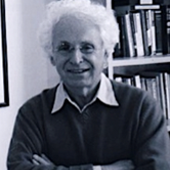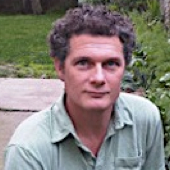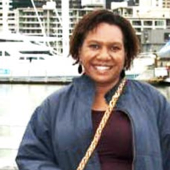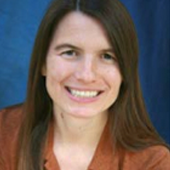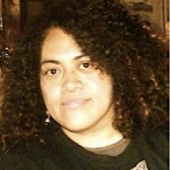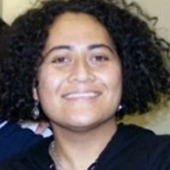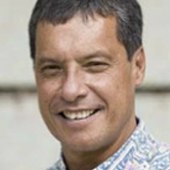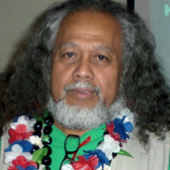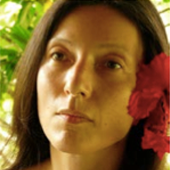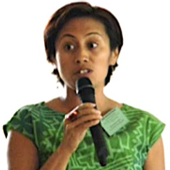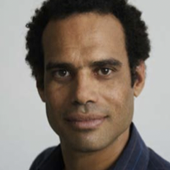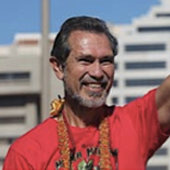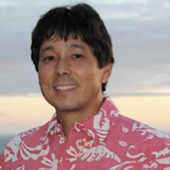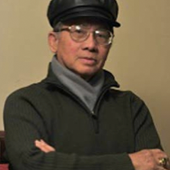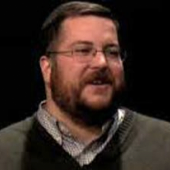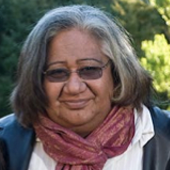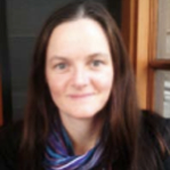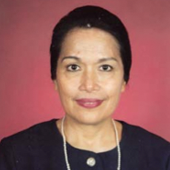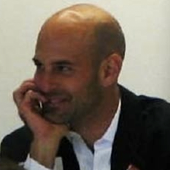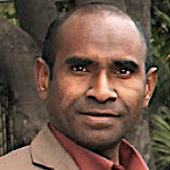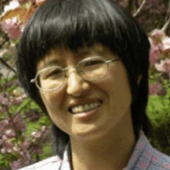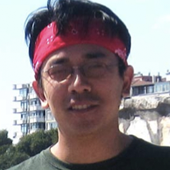The following is a list of the 45 speakers who appeared at Moana Nui 2013. Over the next few weeks we will be adding most of the rest of the speakers’ videos. (In a few upcoming cases, due to technical problems, only the audio will be available.) A full transcript of the event is also being prepared.
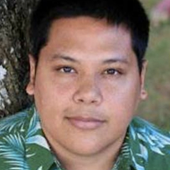
Julian Aguon (Chamorro, Guam) See Video
Professor, Attorney, and Author
Julian Aguon, a native son of Guam, lived many lives before becoming an international attorney-at-law. A prolific writer, gospel singer, human rights campaigner, and international relief worker who has worked, among others, with Mother Teresa’s Homes for the Dying and Destitute in India, Julian’s truest and most enduring impulse has been the pursuit of understanding. Julian brings to the practice of international law a perspective at once instinctively global and distinctively regional, i.e., Pacific. Having for years lived and worked in Guam and the surrounding islands of Micronesia, Julian has honed an intercultural competence allowing him to meet the complex needs of international clients engaging, or seeking to engage, the peoples, governments and legal systems of these small island states. Julian is also a United Nations-recognized expert in the international law on self-determination and a noted legal scholar of U.S. federal-territorial law. His work in these areas has resulted in multiple publications in law reviews and journals, guest lectures at law schools and other academic and civic institutions across the United States including, among others, Yale Law School, UCLA School of Law, Brown University, and the National Center for the Preservation of Democracy. The Petra Foundation recently named Julian a “human rights hero” in recognition of his work in Micronesia.
Professor, Attorney, and Author
Julian Aguon, a native son of Guam, lived many lives before becoming an international attorney-at-law. A prolific writer, gospel singer, human rights campaigner, and international relief worker who has worked, among others, with Mother Teresa’s Homes for the Dying and Destitute in India, Julian’s truest and most enduring impulse has been the pursuit of understanding. Julian brings to the practice of international law a perspective at once instinctively global and distinctively regional, i.e., Pacific. Having for years lived and worked in Guam and the surrounding islands of Micronesia, Julian has honed an intercultural competence allowing him to meet the complex needs of international clients engaging, or seeking to engage, the peoples, governments and legal systems of these small island states. Julian is also a United Nations-recognized expert in the international law on self-determination and a noted legal scholar of U.S. federal-territorial law. His work in these areas has resulted in multiple publications in law reviews and journals, guest lectures at law schools and other academic and civic institutions across the United States including, among others, Yale Law School, UCLA School of Law, Brown University, and the National Center for the Preservation of Democracy. The Petra Foundation recently named Julian a “human rights hero” in recognition of his work in Micronesia.
Christine Ahn (United States)
Co-founder, Korea Policy Institute
Christine Ahn is a policy analyst with expertise in Korea, globalization, militarism, women’s rights, and philanthropy. She is the editor of Shafted: Free Trade and America’s Working Poor (2003) and contributor to The Revolution Will Not be Funded (2009). She has addressed Congress, the United Nations and the National Human Rights Commission in South Korea. Ahn has been interviewed on Al-Jazeera, BBC, CNN, Democracy Now!, NPR, NBC, and Voice of America. She is a columnist with Institute for Policy Studies’ Foreign Policy In Focus, and her op-eds have appeared in The International Herald Tribune/The New York Times, Asia Times, and the San Francisco Chronicle. She is co-founder of the National Campaign to End the Korean War and Korean Americans for Fair Trade. Ahn is currently the Senior Research and Policy Analyst at the Global Fund for Women and Senior Fellow with the Oakland Institute. She holds a master’s degree in public policy from Georgetown University and a certificate in ecological horticulture from the University of California, Santa Cruz. She has been inducted into the OMB Watch Public Interest Hall of Fame and recognized as a Rising Peacemaker by the Agape Foundation.
Co-founder, Korea Policy Institute
Christine Ahn is a policy analyst with expertise in Korea, globalization, militarism, women’s rights, and philanthropy. She is the editor of Shafted: Free Trade and America’s Working Poor (2003) and contributor to The Revolution Will Not be Funded (2009). She has addressed Congress, the United Nations and the National Human Rights Commission in South Korea. Ahn has been interviewed on Al-Jazeera, BBC, CNN, Democracy Now!, NPR, NBC, and Voice of America. She is a columnist with Institute for Policy Studies’ Foreign Policy In Focus, and her op-eds have appeared in The International Herald Tribune/The New York Times, Asia Times, and the San Francisco Chronicle. She is co-founder of the National Campaign to End the Korean War and Korean Americans for Fair Trade. Ahn is currently the Senior Research and Policy Analyst at the Global Fund for Women and Senior Fellow with the Oakland Institute. She holds a master’s degree in public policy from Georgetown University and a certificate in ecological horticulture from the University of California, Santa Cruz. She has been inducted into the OMB Watch Public Interest Hall of Fame and recognized as a Rising Peacemaker by the Agape Foundation.
Galina Angarova (Buryat, Siberia/Mongolia) See Video
Program Director, Pacific Environment
Galina Angarova is Pacific Environment’s Russia Program Director. She is a representative of the Buryat peoples, a Russian indigenous group. She was born and raised in the Lake Baikal area. Galina’s work in the region has concentrated on issues surrounding resource extraction and the impacts of development (oil, gas and mineral development in particular) on indigenous and local communities in Siberia and the Russian Far East, including the Kamchatka and Bering Strait regions. She has directly helped to organize, encourage and support a highly effective coalition of indigenous and environmental organizations working on these issues, including activist opposition to the dangerous Altai pipeline project, which threatens to cross through indigenous territories of Altai in Central Siberia. Galina received an Edmund S. Muskie Graduate Fellowship from the U.S. Department of State to complete a master’s degree in Public Administration from the University of New Mexico in 2002. Galina previously worked for the Red Cross and the Asia Foundation and has several years of experience in non-profit management and a strong background in environmental activism and indigenous rights in the Buryatia and Irkutsk regions of Russia. She is fluent in English and Russian, has knowledge of Buryat, Mongolian, and Chinese, and maintains close working relationships with indigenous community leaders in Russia, the United States and Canada. In October 2010, Galina was awarded the Young Non-profit Professional Network’s award for outstanding achievements as a non-profit employee. She currently serves on board of International Funders for Indigenous Peoples.
Program Director, Pacific Environment
Galina Angarova is Pacific Environment’s Russia Program Director. She is a representative of the Buryat peoples, a Russian indigenous group. She was born and raised in the Lake Baikal area. Galina’s work in the region has concentrated on issues surrounding resource extraction and the impacts of development (oil, gas and mineral development in particular) on indigenous and local communities in Siberia and the Russian Far East, including the Kamchatka and Bering Strait regions. She has directly helped to organize, encourage and support a highly effective coalition of indigenous and environmental organizations working on these issues, including activist opposition to the dangerous Altai pipeline project, which threatens to cross through indigenous territories of Altai in Central Siberia. Galina received an Edmund S. Muskie Graduate Fellowship from the U.S. Department of State to complete a master’s degree in Public Administration from the University of New Mexico in 2002. Galina previously worked for the Red Cross and the Asia Foundation and has several years of experience in non-profit management and a strong background in environmental activism and indigenous rights in the Buryatia and Irkutsk regions of Russia. She is fluent in English and Russian, has knowledge of Buryat, Mongolian, and Chinese, and maintains close working relationships with indigenous community leaders in Russia, the United States and Canada. In October 2010, Galina was awarded the Young Non-profit Professional Network’s award for outstanding achievements as a non-profit employee. She currently serves on board of International Funders for Indigenous Peoples.
Walden Bello (Philippines)
Member, House of Representatives of the Philippines representing Akbayan (Citizens’ Action Party); member of the Board, Focus on the Global South
Walden Bello is a Filipino author, academic, and political analyst. He is a member of the Philippines House of Representatives and a member of the board and former executive director of Focus on the Global South. In addition, Bello is an adjunct professor at the State University of New York at Binghamton and St. Mary’s University in Halifax, Canada and author or co-author of 18 books, including Capitalism’s Last Stand? (2013), Food Wars (2009) and American Lake: the Nuclear Peril in the Pacific (1984). He was also a professor of sociology and public administration at the University of the Philippines Diliman. Prior to that, Bello was executive director of the Institute for Food and Development Policy (Food First) in Oakland, California. Bello obtained his doctorate in sociology at Princeton University and subsequently taught at the University of California, Berkeley, where he was a research associate with the Center for South East Asian Studies. In 2003, Bello was awarded the Right Livelihood Award, which describes him as “one of the leading critics of the current model of economic globalization, combining the roles of intellectual and activist.” He was also named “Outstanding Public Scholar” by the International Studies Association (ISA) in 2008. He is a fellow of the Transnational Institute based in Amsterdam, a columnist for Foreign Policy In Focus, and Board member of the International Forum on Globalization
Member, House of Representatives of the Philippines representing Akbayan (Citizens’ Action Party); member of the Board, Focus on the Global South
Walden Bello is a Filipino author, academic, and political analyst. He is a member of the Philippines House of Representatives and a member of the board and former executive director of Focus on the Global South. In addition, Bello is an adjunct professor at the State University of New York at Binghamton and St. Mary’s University in Halifax, Canada and author or co-author of 18 books, including Capitalism’s Last Stand? (2013), Food Wars (2009) and American Lake: the Nuclear Peril in the Pacific (1984). He was also a professor of sociology and public administration at the University of the Philippines Diliman. Prior to that, Bello was executive director of the Institute for Food and Development Policy (Food First) in Oakland, California. Bello obtained his doctorate in sociology at Princeton University and subsequently taught at the University of California, Berkeley, where he was a research associate with the Center for South East Asian Studies. In 2003, Bello was awarded the Right Livelihood Award, which describes him as “one of the leading critics of the current model of economic globalization, combining the roles of intellectual and activist.” He was also named “Outstanding Public Scholar” by the International Studies Association (ISA) in 2008. He is a fellow of the Transnational Institute based in Amsterdam, a columnist for Foreign Policy In Focus, and Board member of the International Forum on Globalization
Michelle Chan (United States) See Video
Economic Policy Program Director, Friends of the Earth
Michelle Chan directs Friends of the Earth’s Economic Policy Program, which seeks to reform international trade, federal tax and spending policies to promote more environmentally and socially just economies. The program also holds banks and international financial institutions accountable for the environmental and social impacts of their financing activities. She has over 15 years of experience in environmental finance and has led Friends of the Earth’s Green Investments project, which engages in shareholder activism, promotes corporate environmental disclosure, provides outreach to financial analysts, and works with major banks to develop environmental management systems. In 2007, she began a program of work to address Chinese overseas investments, and to promote green banking in China.
Economic Policy Program Director, Friends of the Earth
Michelle Chan directs Friends of the Earth’s Economic Policy Program, which seeks to reform international trade, federal tax and spending policies to promote more environmentally and socially just economies. The program also holds banks and international financial institutions accountable for the environmental and social impacts of their financing activities. She has over 15 years of experience in environmental finance and has led Friends of the Earth’s Green Investments project, which engages in shareholder activism, promotes corporate environmental disclosure, provides outreach to financial analysts, and works with major banks to develop environmental management systems. In 2007, she began a program of work to address Chinese overseas investments, and to promote green banking in China.
Victoria Tauli-Corpuz (Igorot, Philippines) See Video
Executive director, Tebtebba Foundation; Former Chairperson, UN Permanent Forum on Indigenous Issues
Victoria Tauli-Corpuz is an indigenous Igorot from the Cordillera region of the Philippines and directs the Tebtebba Foundation (Indigenous Peoples’ International Centre for Policy Research and Education). A leader in advancing indigenous rights internationally, Tauli-Corpuz began her advocacy in the 70s when the World Bank and the Marcos regime tried to build a big dam in her peoples’ territory. Going beyond her own borders to help protect her people, she became active in advocating for the inclusion of indigenous rights in the policies of key international institutions. These included multinational mining companies, as well as the World Trade Organization, whose rules led to destructive natural resource extraction from indigenous lands. She served as president of the UN Permanent Forum on Indigenous Issues, and in 2007 helped shepherd through the UN Declaration of the Rights of Indigenous Peoples (UNDRIP). She has since led efforts to apply UNDRIP directly to decision-making by governments, most recently in the UN climate convention’s Cancun Agreements. She is also the co-author of Paradigm Wars: Indigenous Peoples Resistance to Globalization (2007) with Jerry Mander, and is a Board Member, and former Chair of the International Forum on Globalization.
Executive director, Tebtebba Foundation; Former Chairperson, UN Permanent Forum on Indigenous Issues
Victoria Tauli-Corpuz is an indigenous Igorot from the Cordillera region of the Philippines and directs the Tebtebba Foundation (Indigenous Peoples’ International Centre for Policy Research and Education). A leader in advancing indigenous rights internationally, Tauli-Corpuz began her advocacy in the 70s when the World Bank and the Marcos regime tried to build a big dam in her peoples’ territory. Going beyond her own borders to help protect her people, she became active in advocating for the inclusion of indigenous rights in the policies of key international institutions. These included multinational mining companies, as well as the World Trade Organization, whose rules led to destructive natural resource extraction from indigenous lands. She served as president of the UN Permanent Forum on Indigenous Issues, and in 2007 helped shepherd through the UN Declaration of the Rights of Indigenous Peoples (UNDRIP). She has since led efforts to apply UNDRIP directly to decision-making by governments, most recently in the UN climate convention’s Cancun Agreements. She is also the co-author of Paradigm Wars: Indigenous Peoples Resistance to Globalization (2007) with Jerry Mander, and is a Board Member, and former Chair of the International Forum on Globalization.
Kang Dong-Kyun (Tamna, Jeju Island, Korea) See Video
Mayor, Gangjeong Village
Kang Dong-Kyun would have been an ordinary tangerine farmer living in peace with his family were it not for his involvement in the huge people’s struggle against the Jeju naval base project since 2007. That is when the South Korean government first proposed base construction in his hometown of Gangjeong, a sustainable farming and fishing village on the south coast of Jeju Island. A landslide majority elected Kang mayor of Gangjeong in 2007. Besides his position as mayor, he holds the title of Executive Chairman of the Villagers’ Committee to Stop the Naval Base Project. Mayor Kang has been arrested numerous times for defending his homeland against militarization, and in 2011, he was imprisoned for three months. Currently, he is being tried in several cases resulting from his protests, and is also serving three years’ probation. He also bears enormous debt due to fines — the price of struggle. He says he will never abandon resisting the base because he is determined to leave Gangjeong, just as it is, to his descendants. As a young man, he dreamed of becoming a police officer. However, that dream was abandoned once he realized that the South Korean dictatorship had blacklisted all his family members as “Communists,” due to their involvement in an independence movement dating back to 1948.
Mayor, Gangjeong Village
Kang Dong-Kyun would have been an ordinary tangerine farmer living in peace with his family were it not for his involvement in the huge people’s struggle against the Jeju naval base project since 2007. That is when the South Korean government first proposed base construction in his hometown of Gangjeong, a sustainable farming and fishing village on the south coast of Jeju Island. A landslide majority elected Kang mayor of Gangjeong in 2007. Besides his position as mayor, he holds the title of Executive Chairman of the Villagers’ Committee to Stop the Naval Base Project. Mayor Kang has been arrested numerous times for defending his homeland against militarization, and in 2011, he was imprisoned for three months. Currently, he is being tried in several cases resulting from his protests, and is also serving three years’ probation. He also bears enormous debt due to fines — the price of struggle. He says he will never abandon resisting the base because he is determined to leave Gangjeong, just as it is, to his descendants. As a young man, he dreamed of becoming a police officer. However, that dream was abandoned once he realized that the South Korean dictatorship had blacklisted all his family members as “Communists,” due to their involvement in an independence movement dating back to 1948.
Bruce Gagnon (United States) See Video
Coordinator, Global Network Against Weapons & Nuclear Power in Space
Bruce Gagnon is the Coordinator of the Global Network Against Weapons & Nuclear Power in Space, which he co-founded in 1992. Between 1983 and 1998, Gagnon was the State Coordinator of the Florida Coalition for Peace & Justice. In 1987, he organized the largest peace protest in Florida history when over 5,000 people marched on Cape Canaveral in opposition to the first flight test of the Trident II nuclear missile. He was the organizer of the Cancel Cassini Campaign that drew enormous support and media coverage around the world and was featured on the TV program 60 Minutes. Gagnon initiated the Maine Campaign to Bring Our War $$ Home in 2009, which makes the important connections between endless war spending and fiscal crisis throughout the U.S. He is a member of the National Writers Union (UAW Local # 1981 AFL-CIO) and writes a popular blog called Organizing Notes. He is a Vietnam-era veteran and began his career by organizing fruit pickers for the United Farm Workers Union in Florida. Gagnon is an active member of Veterans for Peace. You can find out more about the Global Network Against Weapons & Nuclear Power in Space at http://www.space4peace.org.
Coordinator, Global Network Against Weapons & Nuclear Power in Space
Bruce Gagnon is the Coordinator of the Global Network Against Weapons & Nuclear Power in Space, which he co-founded in 1992. Between 1983 and 1998, Gagnon was the State Coordinator of the Florida Coalition for Peace & Justice. In 1987, he organized the largest peace protest in Florida history when over 5,000 people marched on Cape Canaveral in opposition to the first flight test of the Trident II nuclear missile. He was the organizer of the Cancel Cassini Campaign that drew enormous support and media coverage around the world and was featured on the TV program 60 Minutes. Gagnon initiated the Maine Campaign to Bring Our War $$ Home in 2009, which makes the important connections between endless war spending and fiscal crisis throughout the U.S. He is a member of the National Writers Union (UAW Local # 1981 AFL-CIO) and writes a popular blog called Organizing Notes. He is a Vietnam-era veteran and began his career by organizing fruit pickers for the United Farm Workers Union in Florida. Gagnon is an active member of Veterans for Peace. You can find out more about the Global Network Against Weapons & Nuclear Power in Space at http://www.space4peace.org.
Joseph Gerson (United States)
Director of Programs, American Friends Service Committee’s Northeast Region; Director, AFSC’s Peace & Economic Security Program
Dr. Joseph Gerson’s work focuses on education and organizing for peaceful and just alternatives to U.S.-led militarization of the Asia-Pacific region, opposition to foreign military bases, and the abolition of nuclear weapons. He is co-convener the Working Group for Peace and Demilitarization in Asia and the Pacific. He has worked closely with leading Japanese, Korean, Filipino and other Asia-Pacific peace organizations for three decades and has initiated four exchanges between U.S. and Chinese organizations. His books include, Empire and the Bomb: How the US Uses Nuclear Weapons to Dominate the World (2007) and The Sun Never Sets…Confronting the Network of U.S. Foreign Military Bases (1999). His articles have been published in The Bulletin of the Atomic Scientists, The Boston Globe, The Huffington Post, Truthout, Z-Magazine, and others. Dr. Gerson co-founded United for Peace & Justice, the International Network for the Abolition of Foreign Military Bases, and the 2010 NPT Review International Planning Committee. He also serves of the International Coordinating Committee of the No to NATO/No to War Network.
Director of Programs, American Friends Service Committee’s Northeast Region; Director, AFSC’s Peace & Economic Security Program
Dr. Joseph Gerson’s work focuses on education and organizing for peaceful and just alternatives to U.S.-led militarization of the Asia-Pacific region, opposition to foreign military bases, and the abolition of nuclear weapons. He is co-convener the Working Group for Peace and Demilitarization in Asia and the Pacific. He has worked closely with leading Japanese, Korean, Filipino and other Asia-Pacific peace organizations for three decades and has initiated four exchanges between U.S. and Chinese organizations. His books include, Empire and the Bomb: How the US Uses Nuclear Weapons to Dominate the World (2007) and The Sun Never Sets…Confronting the Network of U.S. Foreign Military Bases (1999). His articles have been published in The Bulletin of the Atomic Scientists, The Boston Globe, The Huffington Post, Truthout, Z-Magazine, and others. Dr. Gerson co-founded United for Peace & Justice, the International Network for the Abolition of Foreign Military Bases, and the 2010 NPT Review International Planning Committee. He also serves of the International Coordinating Committee of the No to NATO/No to War Network.
Corrina Gould (Ohlone, United States)
Title VII coordinator, American Indian Child Resource Center’s Office of Indian Education, Oakland.
Corrina Gould, of Chochenyo and Karkin Ohlone ancestry, is co-founder and lead organizer for Indian People Organizing for Change, which works to raise awareness about the desecration of sacred sites in the Bay Area, among other issues. This year she helped lead a successful 109-day prayerful vigil and occupation of the Sogorea Te site in Vallejo, California. Gould also sits on the California Indigenous Environmental Association, Native American Committee for the American Friends Service Committee, and Oakland Street Academy Foundation boards.
Title VII coordinator, American Indian Child Resource Center’s Office of Indian Education, Oakland.
Corrina Gould, of Chochenyo and Karkin Ohlone ancestry, is co-founder and lead organizer for Indian People Organizing for Change, which works to raise awareness about the desecration of sacred sites in the Bay Area, among other issues. This year she helped lead a successful 109-day prayerful vigil and occupation of the Sogorea Te site in Vallejo, California. Gould also sits on the California Indigenous Environmental Association, Native American Committee for the American Friends Service Committee, and Oakland Street Academy Foundation boards.
Michael Leon Guerrero (Chamorro, United States)
Executive Director, UNITY
Michael Leon Guerrero is currently the Executive Director of UNITY – a network of 6 national alliances: Grassroots Global Justice (GGJ), Jobs with Justice, National Day Laborer Organizing Network, National Domestic Workers Alliance, National Guestworkers Alliance and Right to the City Alliance. Prior to UNITY, beginning in 2004, he was the National Coordinator of GGJ, strengthening the capacity of grassroots organizations to coordinate with international social movements. He also served as a community organizer and Executive Director of Southwest Organizing Project, supervising organizing efforts in low-income communities throughout New Mexico on issues of environmental justice, corporate accountability and globalization. Michael has served on various boards, including Jobs with Justice, the New World Foundation and the Asian Pacific Environmental Network. He also served on the National Planning Committee of the United States Social Forum and the International Council of the World Social Forum.
Executive Director, UNITY
Michael Leon Guerrero is currently the Executive Director of UNITY – a network of 6 national alliances: Grassroots Global Justice (GGJ), Jobs with Justice, National Day Laborer Organizing Network, National Domestic Workers Alliance, National Guestworkers Alliance and Right to the City Alliance. Prior to UNITY, beginning in 2004, he was the National Coordinator of GGJ, strengthening the capacity of grassroots organizations to coordinate with international social movements. He also served as a community organizer and Executive Director of Southwest Organizing Project, supervising organizing efforts in low-income communities throughout New Mexico on issues of environmental justice, corporate accountability and globalization. Michael has served on various boards, including Jobs with Justice, the New World Foundation and the Asian Pacific Environmental Network. He also served on the National Planning Committee of the United States Social Forum and the International Council of the World Social Forum.
Santi Hitorangi (Maohi Rapanui, Easter Island)
Social Activist, Rapanui Cultural and Political Knowledge Practitioner
Santi Hitorangi Atamu, political director of the Hitorangi Indigenous Community-Rapa Nui, is a Rapa Nui international representative and UN Permanent Forum on Indigenous Issues’ Pacific Caucus Representative to Rio+20, Brazil 2012. His focus as an activist and documentary filmmaker is on self-determination and human rights in the Pacific and on Rapa Nui. He is currently working in New York and Rapa Nui.
Social Activist, Rapanui Cultural and Political Knowledge Practitioner
Santi Hitorangi Atamu, political director of the Hitorangi Indigenous Community-Rapa Nui, is a Rapa Nui international representative and UN Permanent Forum on Indigenous Issues’ Pacific Caucus Representative to Rio+20, Brazil 2012. His focus as an activist and documentary filmmaker is on self-determination and human rights in the Pacific and on Rapa Nui. He is currently working in New York and Rapa Nui.
Christine Hong (United States)
Korea Policy Institute; Professor, UC Santa Cruz
Christine Hong is an assistant professor in the Literature Department at UC Santa Cruz where she specializes in transnational Asian American, Korean diaspora, and critical Pacific Rim studies and where she has organized, with students, staff, community members, and faculty, for Critical Race and Ethnic Studies. She received her PhD from UC Berkeley and is at work on a book project titled Blurring the Color Line: Racial Fictions, Militarized Humanity, and the Pax Americana in the Pacific Rim that examines the historic relation of post-1945 Afro-Asian human rights literature to the Pax Americana, the U.S. military “peace” that restructured the Asia Pacific following Japan’s Pacific War defeat. She is an executive board member of the Korea Policy Institute, a coordinating committee member of the National Campaign to End the Korean War, a steering committee member of the Alliance of Scholars Concerned about Korea, and a member of the Working Group on Peace and Demilitarization in Asia and the Pacific.
Korea Policy Institute; Professor, UC Santa Cruz
Christine Hong is an assistant professor in the Literature Department at UC Santa Cruz where she specializes in transnational Asian American, Korean diaspora, and critical Pacific Rim studies and where she has organized, with students, staff, community members, and faculty, for Critical Race and Ethnic Studies. She received her PhD from UC Berkeley and is at work on a book project titled Blurring the Color Line: Racial Fictions, Militarized Humanity, and the Pax Americana in the Pacific Rim that examines the historic relation of post-1945 Afro-Asian human rights literature to the Pax Americana, the U.S. military “peace” that restructured the Asia Pacific following Japan’s Pacific War defeat. She is an executive board member of the Korea Policy Institute, a coordinating committee member of the National Campaign to End the Korean War, a steering committee member of the Alliance of Scholars Concerned about Korea, and a member of the Working Group on Peace and Demilitarization in Asia and the Pacific.
Kyle Kajihiro (Hawai’i) See Video
American Friends Service Committee; DMZ Hawai’i /Aloha Aina
Kyle Kajihiro is a board member of Hawai’i Peace and Justice, the successor organization to the American Friends Service Committee (AFSC) Hawai’i Area Program. From 1996 to 2011, Kajihiro served as a program coordinator, and later program director, for the American Friends Service Committee Hawai’i. Born and raised in Hawai’i, Kajihiro was involved in human rights activism, Central America solidarity, and immigrant worker organizing while living in Oregon in the 1980s and 1990s. His current work focuses on research, education, and action to counter U.S. militarization in Hawai’i. He has published numerous articles about militarization and resistance in Hawai’i and has participated in solidarity delegations and international conferences to speak about resistance to the U.S. military occupation of the Hawaiian Islands.
American Friends Service Committee; DMZ Hawai’i /Aloha Aina
Kyle Kajihiro is a board member of Hawai’i Peace and Justice, the successor organization to the American Friends Service Committee (AFSC) Hawai’i Area Program. From 1996 to 2011, Kajihiro served as a program coordinator, and later program director, for the American Friends Service Committee Hawai’i. Born and raised in Hawai’i, Kajihiro was involved in human rights activism, Central America solidarity, and immigrant worker organizing while living in Oregon in the 1980s and 1990s. His current work focuses on research, education, and action to counter U.S. militarization in Hawai’i. He has published numerous articles about militarization and resistance in Hawai’i and has participated in solidarity delegations and international conferences to speak about resistance to the U.S. military occupation of the Hawaiian Islands.
Terri Keko’olani (Kanaka Maoli, Hawai’i) See Video
Hawai’i Peace and Justice; DMZ Hawai’i/Aloha Aina
Terri Keko’olani is a Kanaka Maoli (Native Hawaiian) community organizer with Hawai’i Peace & Justice and DMZ Hawai’i/Aloha Aina. She is also a member of the International Women’s Network Against Militarism, Ohana Koa, Nuclear Free and Independent Pacific and M.A.N.A. (Movement for Aloha No ka Aina), an independence group. As an activist for over 35 years, she has been involved in the fight for Hawaiian sovereignty, protection of sacred sites, anti-eviction struggles, the movement to stop the U.S. Navy from bombing Kahoolawe island and a Pacific movement to keep the island nations across the Pacific Ocean nuclear free. Her main area of work has been focused on the U.S. military’s impacts and buildup in Hawai’i. The military occupies about 25% of land on Oahu and 6% across the islands, much of it taken from the national lands of the Hawaiian Kingdom. Keko’olani was one of the co-organizers of the 2011 Moana Nui events in Honolulu, in opposition to the creation of the new APEC and TPP trade agreements for Pacific Rim countries. She is also a co-organizer of a popular off-the-grid “Demilitarization DeTour” sponsored by DMZ Hawaii, visiting the various hotspots where military expansion has impacted the community.
Hawai’i Peace and Justice; DMZ Hawai’i/Aloha Aina
Terri Keko’olani is a Kanaka Maoli (Native Hawaiian) community organizer with Hawai’i Peace & Justice and DMZ Hawai’i/Aloha Aina. She is also a member of the International Women’s Network Against Militarism, Ohana Koa, Nuclear Free and Independent Pacific and M.A.N.A. (Movement for Aloha No ka Aina), an independence group. As an activist for over 35 years, she has been involved in the fight for Hawaiian sovereignty, protection of sacred sites, anti-eviction struggles, the movement to stop the U.S. Navy from bombing Kahoolawe island and a Pacific movement to keep the island nations across the Pacific Ocean nuclear free. Her main area of work has been focused on the U.S. military’s impacts and buildup in Hawai’i. The military occupies about 25% of land on Oahu and 6% across the islands, much of it taken from the national lands of the Hawaiian Kingdom. Keko’olani was one of the co-organizers of the 2011 Moana Nui events in Honolulu, in opposition to the creation of the new APEC and TPP trade agreements for Pacific Rim countries. She is also a co-organizer of a popular off-the-grid “Demilitarization DeTour” sponsored by DMZ Hawaii, visiting the various hotspots where military expansion has impacted the community.
Q’orianka Kilcher (Quechua, United States)
Actress, Singer, and Activist
Q’orianka Kilcher is an actress, singer, and human rights and environmental activist. She played the title role in the film Princess Kaiulani about the United States’ overthrow of the Hawaiian monarchy, and in 2009, performed in The People Speak, a documentary based on historian Howard Zinn’s A People’s History of the United States. Traveling frequently to speak at youth events, colleges and universities, Kilcher has been invited as a speaker and workshop facilitator at international conferences and events. She also recently launched her own youth driven human rights and environmental organization, On-q Initiative, to connect young Hollywood with youth activist leaders and projects from around the world in support of environmental sustainability, corporate accountability, and basic human rights. Through her production company, IQ-Films, Kilcher is also producing several cause driven documentaries and youth-programming projects. In 2007, she won the Brower Youth Award, a premier environmental award, for her work in persuading Occidental Petroleum to withdraw from the Peruvian Amazon valley.
Actress, Singer, and Activist
Q’orianka Kilcher is an actress, singer, and human rights and environmental activist. She played the title role in the film Princess Kaiulani about the United States’ overthrow of the Hawaiian monarchy, and in 2009, performed in The People Speak, a documentary based on historian Howard Zinn’s A People’s History of the United States. Traveling frequently to speak at youth events, colleges and universities, Kilcher has been invited as a speaker and workshop facilitator at international conferences and events. She also recently launched her own youth driven human rights and environmental organization, On-q Initiative, to connect young Hollywood with youth activist leaders and projects from around the world in support of environmental sustainability, corporate accountability, and basic human rights. Through her production company, IQ-Films, Kilcher is also producing several cause driven documentaries and youth-programming projects. In 2007, she won the Brower Youth Award, a premier environmental award, for her work in persuading Occidental Petroleum to withdraw from the Peruvian Amazon valley.
Akihiko Kimijima (Japan)
Professor, Ritsumeikan University
Akihiko Kimijima is Professor of Constitutional Law and Peace Studies at the School of International Relations at Ritsumeikan University in Kyoto, Japan. His research focuses on the relations between constitutions and peace, particularly the peace provision, Article 9, of the Japanese Constitution, now being debated in Japanese political circles. Kimijima is Secretary-General of the Asia-Pacific Peace Research Association (APPRA). He is also active in NGOs such as the International Association of Lawyers Against Nuclear Arms (IALANA), the Nonviolent Peaceforce (an NGO that provides unarmed civilian peacekeeping in conflict areas), and the Global Partnership for the Prevention of Armed Conflict (GPPAC). Kimijima’s recent publications include New Paradigms of Peace Research: The Asia-Pacific Context (2012) and the entry, “Article 9,” in Nigel J. Young (ed.), The Oxford International Encyclopedia of Peace (2010). Every year he nominates a candidate for the Nobel Peace Prize.
Professor, Ritsumeikan University
Akihiko Kimijima is Professor of Constitutional Law and Peace Studies at the School of International Relations at Ritsumeikan University in Kyoto, Japan. His research focuses on the relations between constitutions and peace, particularly the peace provision, Article 9, of the Japanese Constitution, now being debated in Japanese political circles. Kimijima is Secretary-General of the Asia-Pacific Peace Research Association (APPRA). He is also active in NGOs such as the International Association of Lawyers Against Nuclear Arms (IALANA), the Nonviolent Peaceforce (an NGO that provides unarmed civilian peacekeeping in conflict areas), and the Global Partnership for the Prevention of Armed Conflict (GPPAC). Kimijima’s recent publications include New Paradigms of Peace Research: The Asia-Pacific Context (2012) and the entry, “Article 9,” in Nigel J. Young (ed.), The Oxford International Encyclopedia of Peace (2010). Every year he nominates a candidate for the Nobel Peace Prize.
Rosa Koian (Kombigo, Papua, New Guinea) See Video
Networking Coordinator, Bismarck Ramu Group
Rosa Koian is the Networking Coordinator of Bismarck Ramu Group, a Papua New Guinean-based local NGO, that empowers indigenous communities on development and conservation issues. This includes legally challenging the advances of transnational corporations and extractive industries in the pacific island country. As a longtime community development worker and activist, Koian highlights issues that she believes receive too little attention at home and overseas. She works to reduce practices that degrade the Papuan environment, such as large-scale resource extraction.
Networking Coordinator, Bismarck Ramu Group
Rosa Koian is the Networking Coordinator of Bismarck Ramu Group, a Papua New Guinean-based local NGO, that empowers indigenous communities on development and conservation issues. This includes legally challenging the advances of transnational corporations and extractive industries in the pacific island country. As a longtime community development worker and activist, Koian highlights issues that she believes receive too little attention at home and overseas. She works to reduce practices that degrade the Papuan environment, such as large-scale resource extraction.
Dohee Lee (Tamna, Jeju Island/United States)
Traditional Korean singer, Oakland Asian Cultural Center
Born on Jeju Island in South Korea, Dohee Lee studied Korean dance, music, percussion, and vocals at the master level. Since her arrival in the U.S. she has been a vital contributor to both the traditional and contemporary arts landscape of the San Francisco Bay Area and beyond. Lee’s work focuses on integration of traditional forms and contemporary arts through music, movement, images, costumes, and installations. Her distinctive and profound performance style evokes the full spectrum of human emotion: the primordial, futuristic, visible, and invisible realms. A review that that appeared in the Chicago Tribune stated, “Lee unfurled an extraordinary lexicon of vocal colors, tones and textures. Yet she deftly controlled these otherworldly sounds…with her sinuous, thoroughly personalized one-woman choreography, self-styled art form.” She teaches at Oakland Asian Cultural Center, Jamaesori and Tamalpa Institute.
Traditional Korean singer, Oakland Asian Cultural Center
Born on Jeju Island in South Korea, Dohee Lee studied Korean dance, music, percussion, and vocals at the master level. Since her arrival in the U.S. she has been a vital contributor to both the traditional and contemporary arts landscape of the San Francisco Bay Area and beyond. Lee’s work focuses on integration of traditional forms and contemporary arts through music, movement, images, costumes, and installations. Her distinctive and profound performance style evokes the full spectrum of human emotion: the primordial, futuristic, visible, and invisible realms. A review that that appeared in the Chicago Tribune stated, “Lee unfurled an extraordinary lexicon of vocal colors, tones and textures. Yet she deftly controlled these otherworldly sounds…with her sinuous, thoroughly personalized one-woman choreography, self-styled art form.” She teaches at Oakland Asian Cultural Center, Jamaesori and Tamalpa Institute.
Annie Leonard (United States) See Video
Co-Director, The Story of Stuff Project
Annie Leonard has dedicated nearly two decades to investigating and organizing on environmental health and justice issues. Leonard is writer and host of the popular online film The Story of Stuff, which has been viewed over 20 million times since its release in December 2007. Prior to making The Story of Stuff, she worked with the Funders Workgroup for Sustainable Production and Consumption, GAIA (Global Alliance for Incinerator Alternatives), Health Care Without Harm, Essential Action and Greenpeace International. She currently serves on the boards of GAIA and Public Citizen, and has previously served on the boards of the Public Citizen, Grassroots Recycling Network, International Forum on Globalization, Environmental Health Fund, Global Greengrants India and Greenpeace India. Leonard’s first book—The Story of Stuff—was published by Free Press (an imprint of Simon & Schuster) in March 2010.
Co-Director, The Story of Stuff Project
Annie Leonard has dedicated nearly two decades to investigating and organizing on environmental health and justice issues. Leonard is writer and host of the popular online film The Story of Stuff, which has been viewed over 20 million times since its release in December 2007. Prior to making The Story of Stuff, she worked with the Funders Workgroup for Sustainable Production and Consumption, GAIA (Global Alliance for Incinerator Alternatives), Health Care Without Harm, Essential Action and Greenpeace International. She currently serves on the boards of GAIA and Public Citizen, and has previously served on the boards of the Public Citizen, Grassroots Recycling Network, International Forum on Globalization, Environmental Health Fund, Global Greengrants India and Greenpeace India. Leonard’s first book—The Story of Stuff—was published by Free Press (an imprint of Simon & Schuster) in March 2010.
Jerry Mander (United States)
Founder, Distinguished Fellow, International Forum on Globalization
Prior to his role at IFG, Jerry Mander was program director for the Foundation for Deep Ecology, and executive director of the Public Media Center, a non-profit public interest advertising and public relations agency. In the 1960s, Mander was president of a major San Francisco advertising company before turning his talents to environmental campaigns that kept dams out of the Grand Canyon, established Redwood National Park, and stopped production of the Supersonic Transport, as well as numerous anti-war campaigns. His books include Four Arguments for the Elimination of Television (1977); In the Absence of the Sacred (1991); The Case Against the Global Economy, (with Edward Goldsmith) (1996); Paradigm Wars: Indigenous Peoples Resistance to Globalization (with Victoria Tauli-Corpuz) (2007); The Superferry Chronicles, Hawaii’s Resistance to Militarization (with Koohan Paik) (2009); and The Capitalism Papers: Fatal Flaws of an Obsolete System (2012).
Founder, Distinguished Fellow, International Forum on Globalization
Prior to his role at IFG, Jerry Mander was program director for the Foundation for Deep Ecology, and executive director of the Public Media Center, a non-profit public interest advertising and public relations agency. In the 1960s, Mander was president of a major San Francisco advertising company before turning his talents to environmental campaigns that kept dams out of the Grand Canyon, established Redwood National Park, and stopped production of the Supersonic Transport, as well as numerous anti-war campaigns. His books include Four Arguments for the Elimination of Television (1977); In the Absence of the Sacred (1991); The Case Against the Global Economy, (with Edward Goldsmith) (1996); Paradigm Wars: Indigenous Peoples Resistance to Globalization (with Victoria Tauli-Corpuz) (2007); The Superferry Chronicles, Hawaii’s Resistance to Militarization (with Koohan Paik) (2009); and The Capitalism Papers: Fatal Flaws of an Obsolete System (2012).
Victor Menotti (United States)
Executive Director, International Forum on Globalization
Victor Menotti was the IFG’s first employee upon its founding in 1994 and in 2009 became its Executive Director. Victor has written and spoken extensively about the impact of globalization on ecosystems, and he has helped build international networks among the traditional farming, forest, fishing, and indigenous communities whose survival depends on them. He is the author of the IFG report, “Free Trade, Free Logging: How the World Trade Organization Undermines Global Forest Conservation,” “The Other Oil War: The Halliburton Agenda on WTO Energy Services,” the chapter “WTO and Native Sovereignty” in Paradigm Wars: Indigenous Peoples’ Resistance to Economic Globalization, and, ”The WTO and Sustainable Fisheries” for the Institute for Fisheries Resources. Victor is currently a national leader in the growing U.S. battle against extreme wealth concentration, and corporate political domination in the United States. Victor earned his degree in International Relations from UCLA, and is fluent in Spanish, Portuguese, French, Italian, and some Slovak.
Executive Director, International Forum on Globalization
Victor Menotti was the IFG’s first employee upon its founding in 1994 and in 2009 became its Executive Director. Victor has written and spoken extensively about the impact of globalization on ecosystems, and he has helped build international networks among the traditional farming, forest, fishing, and indigenous communities whose survival depends on them. He is the author of the IFG report, “Free Trade, Free Logging: How the World Trade Organization Undermines Global Forest Conservation,” “The Other Oil War: The Halliburton Agenda on WTO Energy Services,” the chapter “WTO and Native Sovereignty” in Paradigm Wars: Indigenous Peoples’ Resistance to Economic Globalization, and, ”The WTO and Sustainable Fisheries” for the Institute for Fisheries Resources. Victor is currently a national leader in the growing U.S. battle against extreme wealth concentration, and corporate political domination in the United States. Victor earned his degree in International Relations from UCLA, and is fluent in Spanish, Portuguese, French, Italian, and some Slovak.
John M. Miller (United States)
National Coordinator, East Timor and Indonesia Action Network (ETAN)
John M. Miller co-founded the East Timor and Indonesia Action Network (ETAN) in 1991. He is ETAN’s national coordinator and has been on its staff since late 1996. He, along with ETAN, received the John Rumbiak Human Rights Defenders Award for 2009. On May 21, 2012, the 10th anniversary of the restoration of independence, Miller accepted on behalf of ETAN the Order of Timor-Leste (Ordem Timor-Leste), the highest award that the Democratic Republic of Timor-Leste bestows. He is currently treasurer of the War Resisters League. Miller served as staff for a Parliamentarians for East Timor observer mission to the 1999 referendum in East Timor. He was founder and director of the Foreign Bases Project. Miller has appeared on Australian broadcasting, CNN, CNBC, BBC, CBC, Pacifica’s Democracy Now! and a numerous other local radio programs. He has written for Foreign Policy in Focus, Inside Indonesia, Peacework, WIN Magazine, and elsewhere. To learn more about ETAN, please visit http://www.etan.org.
National Coordinator, East Timor and Indonesia Action Network (ETAN)
John M. Miller co-founded the East Timor and Indonesia Action Network (ETAN) in 1991. He is ETAN’s national coordinator and has been on its staff since late 1996. He, along with ETAN, received the John Rumbiak Human Rights Defenders Award for 2009. On May 21, 2012, the 10th anniversary of the restoration of independence, Miller accepted on behalf of ETAN the Order of Timor-Leste (Ordem Timor-Leste), the highest award that the Democratic Republic of Timor-Leste bestows. He is currently treasurer of the War Resisters League. Miller served as staff for a Parliamentarians for East Timor observer mission to the 1999 referendum in East Timor. He was founder and director of the Foreign Bases Project. Miller has appeared on Australian broadcasting, CNN, CNBC, BBC, CBC, Pacifica’s Democracy Now! and a numerous other local radio programs. He has written for Foreign Policy in Focus, Inside Indonesia, Peacework, WIN Magazine, and elsewhere. To learn more about ETAN, please visit http://www.etan.org.
Anuradha Mittal (India/United States)
Founder and Executive Director, Oakland Institute
Anuradha Mittal is an internationally renowned expert on trade, development, human rights, and agriculture issues, and leader of global movement against land-grabbing and resource-raiding, especially on indigenous lands. Recipient of several awards, Anuradha Mittal was named as the Most Valuable Thinker in 2008 by the Nation magazine. More recently, the Institute under Anuradha’s leadership unveiled land investment deals in Africa, which revealed a disturbing pattern of a lack of transparency, fairness, and accountability. The dynamic relationship between research, advocacy, and international media coverage has resulted in an amazing string of successes and organizing in the U.S. and abroad. See www.oaklandinstitute.org. Author and editor of numerous books and reports, Anuradha’s articles and opinion pieces have been published in widely circulated newspapers including the Guardian, Los Angeles Times, the New York Times, Chicago Tribune, and the Nation. Anuradha has addressed the Congress, the United Nations, given several hundred keynote addresses and has been interviewed on CNN, BBC World, CBC, ABC, Al-Jazeera, National Public Radio and Voice of America. Anuradha is on the board and advisory committees of several non profit organizations including the International Forum on Globalization and is a member of the independent board of Ben & Jerry’s which focuses on providing leadership for Ben & Jerry’s social mission and brand integrity.
Founder and Executive Director, Oakland Institute
Anuradha Mittal is an internationally renowned expert on trade, development, human rights, and agriculture issues, and leader of global movement against land-grabbing and resource-raiding, especially on indigenous lands. Recipient of several awards, Anuradha Mittal was named as the Most Valuable Thinker in 2008 by the Nation magazine. More recently, the Institute under Anuradha’s leadership unveiled land investment deals in Africa, which revealed a disturbing pattern of a lack of transparency, fairness, and accountability. The dynamic relationship between research, advocacy, and international media coverage has resulted in an amazing string of successes and organizing in the U.S. and abroad. See www.oaklandinstitute.org. Author and editor of numerous books and reports, Anuradha’s articles and opinion pieces have been published in widely circulated newspapers including the Guardian, Los Angeles Times, the New York Times, Chicago Tribune, and the Nation. Anuradha has addressed the Congress, the United Nations, given several hundred keynote addresses and has been interviewed on CNN, BBC World, CBC, ABC, Al-Jazeera, National Public Radio and Voice of America. Anuradha is on the board and advisory committees of several non profit organizations including the International Forum on Globalization and is a member of the independent board of Ben & Jerry’s which focuses on providing leadership for Ben & Jerry’s social mission and brand integrity.
Rosa Moiwend (Malind, West Papua, New Guinea)
Independent campaigner and Nonviolence educator
Rosa Biwangko Moiwend is a West Papuan woman. Her father is from the Malind tribe in the south and her mother’s parents are from Muyu (in the south) and Mee (in the centre) of West Papua. Her work as a human rights activist, campaigner, community organiser and educator deepened her involvement in the network of civil resistance movements in West Papua. Since 2008, she has been actively involved in the Pacific Nonviolence Network as an organiser, educator, and interpreter. She is also part of the campaign against MIFEE, the planned food and palm oil plantation in Merauke (the south) Papua and member of War Resisters’ International (WRI). In November 2012, she graduated with a master’s degree in Environment, Development, and Policy from the University of Sussex, UK. More recently, she was involved in the formation of the National Papua Solidarity (NAPAS), an Indonesia solidarity action network for West Papua, based in Jakarta.
Independent campaigner and Nonviolence educator
Rosa Biwangko Moiwend is a West Papuan woman. Her father is from the Malind tribe in the south and her mother’s parents are from Muyu (in the south) and Mee (in the centre) of West Papua. Her work as a human rights activist, campaigner, community organiser and educator deepened her involvement in the network of civil resistance movements in West Papua. Since 2008, she has been actively involved in the Pacific Nonviolence Network as an organiser, educator, and interpreter. She is also part of the campaign against MIFEE, the planned food and palm oil plantation in Merauke (the south) Papua and member of War Resisters’ International (WRI). In November 2012, she graduated with a master’s degree in Environment, Development, and Policy from the University of Sussex, UK. More recently, she was involved in the formation of the National Papua Solidarity (NAPAS), an Indonesia solidarity action network for West Papua, based in Jakarta.
Melissa Nelson (Turtle Mountain Anishinaabe, United States) See Video
President, Cultural Conservancy
Melissa K. Nelson is a writer, researcher, educator, media-maker and cultural and environmental activist. Nelson has served as The Cultural Conservancy’s president and executive director since 1993. In 2000 she completed her PhD in Cultural Ecology with an Emphasis in Native American Studies at the University of California, Davis. Since 2002 she has also served as a professor of American Indian Studies at San Francisco State University. Nelson is a Switzer Environmental Fellow and Leadership Award recipient and has served on the boards of numerous environmental organizations including Earth Island Institute and Bioneers. She has received awards and recognition for her films and teaching and speaks nationally and internationally on indigenous knowledge and rights. Her published works have appeared in academic and national journals. Her edited anthology is Original Instructions – Indigenous Teachings For A Sustainable Future (2008). Please visit www.nativeland.org and www.earthdiver.org to learn more.
President, Cultural Conservancy
Melissa K. Nelson is a writer, researcher, educator, media-maker and cultural and environmental activist. Nelson has served as The Cultural Conservancy’s president and executive director since 1993. In 2000 she completed her PhD in Cultural Ecology with an Emphasis in Native American Studies at the University of California, Davis. Since 2002 she has also served as a professor of American Indian Studies at San Francisco State University. Nelson is a Switzer Environmental Fellow and Leadership Award recipient and has served on the boards of numerous environmental organizations including Earth Island Institute and Bioneers. She has received awards and recognition for her films and teaching and speaks nationally and internationally on indigenous knowledge and rights. Her published works have appeared in academic and national journals. Her edited anthology is Original Instructions – Indigenous Teachings For A Sustainable Future (2008). Please visit www.nativeland.org and www.earthdiver.org to learn more.
Fuifuilupe Niumeitolu (Tongan, United States)
Oceania Coalition of Northern California
Fuifuilupe Niumeitolu is a Tongan American artist, scholar, and activist. She has founded several higher education recruitment and retention projects that aim to empower Pacific Islander communities and to create systemic changes to encourage Pacific Islanders to pursue higher education. She was host of “Education is Powerful” on Radio Tonga, San Francisco and founded Mua O: Pacific Islander recruitment programs at the University of California, Berkeley. Niumeitolu is also National Chair of the Native Hawaiian Pacific Islander Civil Rights Commission and is on the founding and organizing committee of several Pacific Islander social justice organizations including OCNC (Oceania Coalition of Northern California). OCNC is a grassroots organization that collaborates with local Native American communities to revive traditional indigenous sacred ceremonies as healing practices. OCNC is also a prisoner abolitionist organization, advocating for Pacific Islander prisoners and their families. Niumeitolu is a Doctoral Candidate at the University of California, Berkeley.
Oceania Coalition of Northern California
Fuifuilupe Niumeitolu is a Tongan American artist, scholar, and activist. She has founded several higher education recruitment and retention projects that aim to empower Pacific Islander communities and to create systemic changes to encourage Pacific Islanders to pursue higher education. She was host of “Education is Powerful” on Radio Tonga, San Francisco and founded Mua O: Pacific Islander recruitment programs at the University of California, Berkeley. Niumeitolu is also National Chair of the Native Hawaiian Pacific Islander Civil Rights Commission and is on the founding and organizing committee of several Pacific Islander social justice organizations including OCNC (Oceania Coalition of Northern California). OCNC is a grassroots organization that collaborates with local Native American communities to revive traditional indigenous sacred ceremonies as healing practices. OCNC is also a prisoner abolitionist organization, advocating for Pacific Islander prisoners and their families. Niumeitolu is a Doctoral Candidate at the University of California, Berkeley.
Loa Niumeitolu (Tongan, United States)
Pacific Islander Community Mental Health Advocate
Sauliloa “Loa” Niumeitolu is a Tongan community organizer, activist and poet. As a Pacific Islander Community Mental Health Advocate, she focuses on addressing Takataapui/LGBTQI2S issues and Pacific Islanders in incarceration. She serves as Spiritual Cultural Advisor for Pacific Islander men support groups in Solano Prison. In 2005, an unprecedented time of social change in Tonga that gave rise to the Public Servant Strike and the 2006 Riots, Niumeitolu worked with the Tongan Pro-Democracy Movement in Tonga to organize direct actions against the privatization of public works. She holds masters’ degrees in English and International Development.
Pacific Islander Community Mental Health Advocate
Sauliloa “Loa” Niumeitolu is a Tongan community organizer, activist and poet. As a Pacific Islander Community Mental Health Advocate, she focuses on addressing Takataapui/LGBTQI2S issues and Pacific Islanders in incarceration. She serves as Spiritual Cultural Advisor for Pacific Islander men support groups in Solano Prison. In 2005, an unprecedented time of social change in Tonga that gave rise to the Public Servant Strike and the 2006 Riots, Niumeitolu worked with the Tongan Pro-Democracy Movement in Tonga to organize direct actions against the privatization of public works. She holds masters’ degrees in English and International Development.
Cynthia Ong (Sabah, Borneo)
CEO, LEAP (Land Empowerment Animals People)
Cynthia Ong has 25 years of entrepreneurship, socio-environmental justice, and community activism through her roles as founder/co-founder, board director and/or CEO of numerous organizations, both for-profit and not-for-profit, in South East Asia and the U.S. Her experience has been in the fields of organizational leadership, special events and project management, and group facilitation/mediation. She is the founder and executive director of LEAP (Land Empowerment Animals People).
CEO, LEAP (Land Empowerment Animals People)
Cynthia Ong has 25 years of entrepreneurship, socio-environmental justice, and community activism through her roles as founder/co-founder, board director and/or CEO of numerous organizations, both for-profit and not-for-profit, in South East Asia and the U.S. Her experience has been in the fields of organizational leadership, special events and project management, and group facilitation/mediation. She is the founder and executive director of LEAP (Land Empowerment Animals People).
Jon Osorio (Kanaka Maoli, Hawai’i)
Professor of Hawaiian Studies, University of Hawai’i, Manoa
In 2010, Jon Osorio was the recipient of the Robert W. Clopton award for Distinguished Community Service. He has been praised for his inspirational work and contributions as an insightful, caring and intellectual leader. Osorio has devoted his life to becoming an expert in Hawai’i politics and history, music and identity, and indigenous civil rights and social justice. He advocates for the restoration of Hawai’i’s political independence and the need to end the military occupation, and is the author of Dismembering Lāhui: A History of the Hawaiian Nation to 1887 (2002). His community service is imbued with the gracious spirit of ohana that values children, elders, and friends. He has truly made a deep impact in the lives of so many people, as well as on numerous communities across the region.
Professor of Hawaiian Studies, University of Hawai’i, Manoa
In 2010, Jon Osorio was the recipient of the Robert W. Clopton award for Distinguished Community Service. He has been praised for his inspirational work and contributions as an insightful, caring and intellectual leader. Osorio has devoted his life to becoming an expert in Hawai’i politics and history, music and identity, and indigenous civil rights and social justice. He advocates for the restoration of Hawai’i’s political independence and the need to end the military occupation, and is the author of Dismembering Lāhui: A History of the Hawaiian Nation to 1887 (2002). His community service is imbued with the gracious spirit of ohana that values children, elders, and friends. He has truly made a deep impact in the lives of so many people, as well as on numerous communities across the region.
Paul O’toko (Chuukese/ Pohnpeian, Federated States of Micronesia/Polynesia)
Director, Indigenous Stewards International
Paul O’toko is an Ocean and Canoe Steward. Until 2012, he was the director of Institute for Indigenous Studies at William Carey International University, in Pasadena, California. He shares his time with his wife and family in California, Hawaii, Chuuk and Pohnpei. O’toko travels to Micronesian communities across the U.S., helping to provide community support on unresolved immigration issues under the Compact of Free Association (COFA), including advocating for the rights of Micronesians to access healthcare and cancer treatment resulting from decades of U.S. nuclear testing. He is actively involved with several First Nations communities and is a pastor and cultural practitioner.
Director, Indigenous Stewards International
Paul O’toko is an Ocean and Canoe Steward. Until 2012, he was the director of Institute for Indigenous Studies at William Carey International University, in Pasadena, California. He shares his time with his wife and family in California, Hawaii, Chuuk and Pohnpei. O’toko travels to Micronesian communities across the U.S., helping to provide community support on unresolved immigration issues under the Compact of Free Association (COFA), including advocating for the rights of Micronesians to access healthcare and cancer treatment resulting from decades of U.S. nuclear testing. He is actively involved with several First Nations communities and is a pastor and cultural practitioner.
Koohan Paik (United States)
International Forum on Globalization
Raised in Korea and Guam, Koohan Paik is Coordinator of the Asia-Pacific program at the International Forum on Globalization. She is also a journalist, media-literacy educator, and award-winning filmmaker. She has degrees in media studies from the University of Southern California and NYU, and has also written extensively about the social and environmental impacts of militarism. Recent articles concerned with Pacific issues have appeared in The Progressive, and in The Nation. She is based in Hawai’i and is co-author of The Superferry Chronicles: Hawaii’s Uprising Against Militarism, Commercialism and the Desecration of the Earth (2008), with Jerry Mander.
International Forum on Globalization
Raised in Korea and Guam, Koohan Paik is Coordinator of the Asia-Pacific program at the International Forum on Globalization. She is also a journalist, media-literacy educator, and award-winning filmmaker. She has degrees in media studies from the University of Southern California and NYU, and has also written extensively about the social and environmental impacts of militarism. Recent articles concerned with Pacific issues have appeared in The Progressive, and in The Nation. She is based in Hawai’i and is co-author of The Superferry Chronicles: Hawaii’s Uprising Against Militarism, Commercialism and the Desecration of the Earth (2008), with Jerry Mander.
Maureen Penjueli (Rotuman, Fiji) See Video
Coordinator, Pacific Network on Globalisation (PANG)
Maureen Penjueli is the Coordinator for the Pacific Network on Globalisation (PANG), a leading Pacific Regional NGO, working specifically on trade and economic justice issues. Since joining PANG, Maureen has been actively engaged in challenging Free Trade Agreements (PACER +, EPA, WTO) that Pacific Island Countries are currently negotiating, through research, lobbying and advocacy with and on behalf of civil society groups, faith based organisations, community groups and customary landowners. Over the last two years, PANG, working with key partners in PNG, Fiji, has been at the forefront of the campaign to stop experimental seabed mining, a new frontier threat to all of Oceania as island governments strive to attract new forms of foreign investment. In addition to challenging FTAs and foreign investment treaties, PANG has been instrumental in driving the bigger political discussions of asserting the ‘right to economic self determination’ based on our traditional and cultural values, which is the cornerstone of our cultures resilience to the global quest for hegemony. Maureen is a dedicated activist and has pursued environmental and social justice issues for over a decade in Oceania.
Coordinator, Pacific Network on Globalisation (PANG)
Maureen Penjueli is the Coordinator for the Pacific Network on Globalisation (PANG), a leading Pacific Regional NGO, working specifically on trade and economic justice issues. Since joining PANG, Maureen has been actively engaged in challenging Free Trade Agreements (PACER +, EPA, WTO) that Pacific Island Countries are currently negotiating, through research, lobbying and advocacy with and on behalf of civil society groups, faith based organisations, community groups and customary landowners. Over the last two years, PANG, working with key partners in PNG, Fiji, has been at the forefront of the campaign to stop experimental seabed mining, a new frontier threat to all of Oceania as island governments strive to attract new forms of foreign investment. In addition to challenging FTAs and foreign investment treaties, PANG has been instrumental in driving the bigger political discussions of asserting the ‘right to economic self determination’ based on our traditional and cultural values, which is the cornerstone of our cultures resilience to the global quest for hegemony. Maureen is a dedicated activist and has pursued environmental and social justice issues for over a decade in Oceania.
Ralph Regenvanu (Ni Vanuatu, Vanuatu) See Video
Minister of Lands, Geology, Mines, Energy and Water
Ralph Regenvanu is an anthropologist, artist, and politician in Vanuatu. He is currently the Minister for Lands and Natural Resources, served in the Cabinet, and has been a Member of Parliament since 2008. In 2010, Regenvanu started Graon mo Jastis Pati (“Land and Justice Party”) and currently serves as its president. Before his involvement in politics, Regenvanu was the director of the Vanuatu National Museum and Cultural Centre from 1995 to 2006, and is a key leader in the effort to preserve cultural knowledge. He was also a board member of the Vanuatu National Cultural Council, a founding member of the Pacific Islands Museums Association, and a member of its executive board from 1997 to 2009. Regenvanu has worked on a number of UNESCO projects, including a draft of the “World Report on Cultural Diversity” and the “Convention for the Safeguarding of Intangible Cultural Heritage.”
Minister of Lands, Geology, Mines, Energy and Water
Ralph Regenvanu is an anthropologist, artist, and politician in Vanuatu. He is currently the Minister for Lands and Natural Resources, served in the Cabinet, and has been a Member of Parliament since 2008. In 2010, Regenvanu started Graon mo Jastis Pati (“Land and Justice Party”) and currently serves as its president. Before his involvement in politics, Regenvanu was the director of the Vanuatu National Museum and Cultural Centre from 1995 to 2006, and is a key leader in the effort to preserve cultural knowledge. He was also a board member of the Vanuatu National Cultural Council, a founding member of the Pacific Islands Museums Association, and a member of its executive board from 1997 to 2009. Regenvanu has worked on a number of UNESCO projects, including a draft of the “World Report on Cultural Diversity” and the “Convention for the Safeguarding of Intangible Cultural Heritage.”
Walter Ritte, Jr. (Kanaka Maoli, Hawai’i) See Video
Hawaiian sovereignty activist, Anti-GMO movement
Walter Ritte has been an activist in Native Hawaiian environmental issues for nearly four decades. As a native of Moloka’i Island, he was initially involved in Hui Alaloa, which fought to maintain Hawaiian access rights. He was one of early warriors involved in resisting the U.S. Navy’s bombing of Kaho’olawe. Ritte and eight others made the first protest landing on the island Kaho’olawe on January 4, 1976. Ritte served in the 1978 Hawai’i State Constitutional Convention and was also one of the first elected trustees to the Office of Hawaiian Affairs. His courage in protecting Kanaka Maoli relationships to the land continues, as Ritte has led the struggles against the genetic modification of Haloa (the taro plant and metaphorical “elder sibling” of Hawaiians), the development of luxury homes at La’au Point, and numerous other Hawaiian and anti-development issues.
Hawaiian sovereignty activist, Anti-GMO movement
Walter Ritte has been an activist in Native Hawaiian environmental issues for nearly four decades. As a native of Moloka’i Island, he was initially involved in Hui Alaloa, which fought to maintain Hawaiian access rights. He was one of early warriors involved in resisting the U.S. Navy’s bombing of Kaho’olawe. Ritte and eight others made the first protest landing on the island Kaho’olawe on January 4, 1976. Ritte served in the 1978 Hawai’i State Constitutional Convention and was also one of the first elected trustees to the Office of Hawaiian Affairs. His courage in protecting Kanaka Maoli relationships to the land continues, as Ritte has led the struggles against the genetic modification of Haloa (the taro plant and metaphorical “elder sibling” of Hawaiians), the development of luxury homes at La’au Point, and numerous other Hawaiian and anti-development issues.
Arnie Saiki (Hawai’i)
Research Director, Statehood Hawai’i /’Imipono Projects, Co-Coordinator, Moana Nui 2011
Imipono Projects received a 2008, “We the People, National Endowment for the Humanities” grant for Arnie Saiki’s research, presentation and program, “Statehood and Hawaii: Correspondences between the State Department, Congress and the United Nations.” He was one of the coordinators for the Moana Nui 2011 meeting in Hawai’i and has since been writing and helping to coordinate the Moana Nui 2013 conference. Other presentations and programs that he organized include “Impact of Immigration on Hawai’i’s Past, Present and Future”; “International Routes: De-occupation, Decolonization and the Declaration on the Rights of Indigenous Peoples”; “History of Hawaiian Political Activism 1887-Present”; “Recovering our Political Past while Probing toward the Future”; “Ho’opunipuni: the Myth of Statehood”; and many short programs related to issues of statehood and colonization in Hawai’i and in the Pacific. He lives in Los Angeles with his family.
Research Director, Statehood Hawai’i /’Imipono Projects, Co-Coordinator, Moana Nui 2011
Imipono Projects received a 2008, “We the People, National Endowment for the Humanities” grant for Arnie Saiki’s research, presentation and program, “Statehood and Hawaii: Correspondences between the State Department, Congress and the United Nations.” He was one of the coordinators for the Moana Nui 2011 meeting in Hawai’i and has since been writing and helping to coordinate the Moana Nui 2013 conference. Other presentations and programs that he organized include “Impact of Immigration on Hawai’i’s Past, Present and Future”; “International Routes: De-occupation, Decolonization and the Declaration on the Rights of Indigenous Peoples”; “History of Hawaiian Political Activism 1887-Present”; “Recovering our Political Past while Probing toward the Future”; “Ho’opunipuni: the Myth of Statehood”; and many short programs related to issues of statehood and colonization in Hawai’i and in the Pacific. He lives in Los Angeles with his family.
Dante C. Simbulan (Philippines)
Professor, Author
Dante C. Simbulan earned his doctorate in Political Science from the Australian National University, received his master’s degree from the University of the Philippines and his Bachelor of Science from the Philippine Military Academy. He taught politics, government and sociology at the Philippine Military Academy, University of the Philippines, Ateneo de Manila University and Maryknoll College. His book, The Modern Principalia: The Historical Evolution of the Philippine Ruling Oligarchy (University of the Philippines Press, 2007, 2nd ed.) based on his doctoral dissertation written in 1965, was a pioneering study of the socio-economic elite in Philippine politics and government—the ruling family political dynasties of today. Dr. Simbulan was Dean of the College of Arts and Sciences at the Polytechnic University of the Philippines when Ferdinand Marcos declared Martial Law. A former political prisoner, he was arrested and detained for more than three years, without charges, when he actively and openly opposed the dictatorship; he was adopted as a “prisoner of conscience” by Amnesty International. While in exile in the United States, he served as the first Executive Director of the Church Coalition for Human Rights in the Philippines (based in Washington, D.C.), which worked for the termination of U.S. support to the Marcos dictatorship. He has since been a leader of the Philippines’ protest movement opposed to U.S. military presence and intervention in the Philippines. He taught at Montgomery College in Maryland and lectured in several universities in the United States and Canada.
Professor, Author
Dante C. Simbulan earned his doctorate in Political Science from the Australian National University, received his master’s degree from the University of the Philippines and his Bachelor of Science from the Philippine Military Academy. He taught politics, government and sociology at the Philippine Military Academy, University of the Philippines, Ateneo de Manila University and Maryknoll College. His book, The Modern Principalia: The Historical Evolution of the Philippine Ruling Oligarchy (University of the Philippines Press, 2007, 2nd ed.) based on his doctoral dissertation written in 1965, was a pioneering study of the socio-economic elite in Philippine politics and government—the ruling family political dynasties of today. Dr. Simbulan was Dean of the College of Arts and Sciences at the Polytechnic University of the Philippines when Ferdinand Marcos declared Martial Law. A former political prisoner, he was arrested and detained for more than three years, without charges, when he actively and openly opposed the dictatorship; he was adopted as a “prisoner of conscience” by Amnesty International. While in exile in the United States, he served as the first Executive Director of the Church Coalition for Human Rights in the Philippines (based in Washington, D.C.), which worked for the termination of U.S. support to the Marcos dictatorship. He has since been a leader of the Philippines’ protest movement opposed to U.S. military presence and intervention in the Philippines. He taught at Montgomery College in Maryland and lectured in several universities in the United States and Canada.
Arthur Stamoulis (United States)
Executive Director, Citizens Trade Campaign
Arthur Stamoulis is executive director of Citizens Trade Campaign, a national coalition of labor, environmental, family farm, consumer and human rights organizations working together for trade policies that promote a just and sustainable global economy. Citizens Trade Campaign was the first to publish leaked text of several of the Trans-Pacific Partnership (TPP) chapters, and organized protests and other civil society responses at each of the TPP negotiating rounds to take place in the United States. It is currently coordinating national campaigns around the TPP and Fast Track authority. Prior to joining Citizens Trade Campaign, Arthur directed the Oregon Fair Trade Campaign. He has also served as director of government affairs for Clean Air Council, an editor at Common Courage Press, and economics editor for Clamor Magazine.
Executive Director, Citizens Trade Campaign
Arthur Stamoulis is executive director of Citizens Trade Campaign, a national coalition of labor, environmental, family farm, consumer and human rights organizations working together for trade policies that promote a just and sustainable global economy. Citizens Trade Campaign was the first to publish leaked text of several of the Trans-Pacific Partnership (TPP) chapters, and organized protests and other civil society responses at each of the TPP negotiating rounds to take place in the United States. It is currently coordinating national campaigns around the TPP and Fast Track authority. Prior to joining Citizens Trade Campaign, Arthur directed the Oregon Fair Trade Campaign. He has also served as director of government affairs for Clean Air Council, an editor at Common Courage Press, and economics editor for Clamor Magazine.
Ali’itasi Stewart (Samoan, New Zealand)
PhD candidate, University of Canterbury, National Centre for Research on Europe and Massey University Albany, Pacific Research.
Ali’itasi Stewart is a PhD candidate at the University of Canterbury, National Centre for Research on Europe and Massey University Albany, Pacific Research. She is a New Zealand born Samoan with 20 years in business/corporate accounting, and 20 years in the grassroots community and education sector as a counselor, activist, and advocate, focusing on indigenous and environmental rights.
PhD candidate, University of Canterbury, National Centre for Research on Europe and Massey University Albany, Pacific Research.
Ali’itasi Stewart is a PhD candidate at the University of Canterbury, National Centre for Research on Europe and Massey University Albany, Pacific Research. She is a New Zealand born Samoan with 20 years in business/corporate accounting, and 20 years in the grassroots community and education sector as a counselor, activist, and advocate, focusing on indigenous and environmental rights.
Gemma Tillack (United States) See Video
Senior Agribusiness Campaigner, Rainforest Action Network
Gemma Tillack directs RAN’s Agribusiness campaign, which is addressing one of the main drivers of rainforest destruction and human rights violations in Indonesia and Borneo Malaysia: industrial palm oil. Prior to this position, she worked for 10 years for The Wilderness Society in Australia, and played a key role in the campaigns that contributed to Gunns Limited’s decision to transition out of native forest logging in Tasmania. For the past two years she has been involved in negotiations that led to the signing of the $274 million Tasmanian Forest Intergovernmental Agreement (TFIGA). Gemma has a background in environmental science and community organizing.
Senior Agribusiness Campaigner, Rainforest Action Network
Gemma Tillack directs RAN’s Agribusiness campaign, which is addressing one of the main drivers of rainforest destruction and human rights violations in Indonesia and Borneo Malaysia: industrial palm oil. Prior to this position, she worked for 10 years for The Wilderness Society in Australia, and played a key role in the campaigns that contributed to Gunns Limited’s decision to transition out of native forest logging in Tasmania. For the past two years she has been involved in negotiations that led to the signing of the $274 million Tasmanian Forest Intergovernmental Agreement (TFIGA). Gemma has a background in environmental science and community organizing.
Trini Torres (Chamorro, Guam)
Microbiologist/Zoologist
Trinidad Torres, a trained microbiologist and zoologist, led a research unit in Ethiopia in the study of the Leishmania protozoa, in which she tested the effects of chemicals and radioactive materials, and also published her results. For three years, she served on the UN Economic Commission for Africa, as well as at World Vision International in Ethiopia, during the devastating drought and famine. In Utah, she ran a community-based school for Pacific-Islander students and volunteer-taught at the Salt Lake City Homeless Shelter School. She has spoken on indigenous rights at the UN in Geneva, at the Fifth Session of the Expert Mechanism on the Rights of Indigenous Peoples. In 2000, she presented a paper “A Century of United States Colonialism in Guam: Historical and Contemporary Struggle,” at the University of Puerto Rico and in Vieques, Puerto Rico. She has served for a decade as Chair of the Guam Commission on Decolonization Task Force for Independence. Torres is currently the Pilong Maga’Haga (chief or woman leader) of Taotaomona Native Rights, and the Elder Maga’Haga of Chamoru Nation, the indigenous sovereignty group of Guam.
Microbiologist/Zoologist
Trinidad Torres, a trained microbiologist and zoologist, led a research unit in Ethiopia in the study of the Leishmania protozoa, in which she tested the effects of chemicals and radioactive materials, and also published her results. For three years, she served on the UN Economic Commission for Africa, as well as at World Vision International in Ethiopia, during the devastating drought and famine. In Utah, she ran a community-based school for Pacific-Islander students and volunteer-taught at the Salt Lake City Homeless Shelter School. She has spoken on indigenous rights at the UN in Geneva, at the Fifth Session of the Expert Mechanism on the Rights of Indigenous Peoples. In 2000, she presented a paper “A Century of United States Colonialism in Guam: Historical and Contemporary Struggle,” at the University of Puerto Rico and in Vieques, Puerto Rico. She has served for a decade as Chair of the Guam Commission on Decolonization Task Force for Independence. Torres is currently the Pilong Maga’Haga (chief or woman leader) of Taotaomona Native Rights, and the Elder Maga’Haga of Chamoru Nation, the indigenous sovereignty group of Guam.
David Vine (United States)
Author, Professor, American University
David Vine is assistant professor of anthropology at American University, in Washington, DC. He is the author of Island of Shame: The Secret History of the U.S. Military Base on Diego Garcia (Princeton University Press, 2009), and the co-author, with the Network of Concerned Anthropologists, of the Counter-Counterinsurgency Manual, or Notes on Demilitarizing American Society (Prickly Paradigm Press, 2009). His other writing has appeared in The New York Times, the Washington Post, the Guardian (London), Mother Jones, Huffington Post, Chronicle of Higher Education, International Migration, and Human Rights Brief, among others. David is currently completing a book about the one thousand U.S. military bases located outside the United States. Many of his articles and information about Island of Shame can be found at http://www.davidvine.net.
Author, Professor, American University
David Vine is assistant professor of anthropology at American University, in Washington, DC. He is the author of Island of Shame: The Secret History of the U.S. Military Base on Diego Garcia (Princeton University Press, 2009), and the co-author, with the Network of Concerned Anthropologists, of the Counter-Counterinsurgency Manual, or Notes on Demilitarizing American Society (Prickly Paradigm Press, 2009). His other writing has appeared in The New York Times, the Washington Post, the Guardian (London), Mother Jones, Huffington Post, Chronicle of Higher Education, International Migration, and Human Rights Brief, among others. David is currently completing a book about the one thousand U.S. military bases located outside the United States. Many of his articles and information about Island of Shame can be found at http://www.davidvine.net.
Herman Wainggai (Melanesian, West Papua, New Guinea) See Video
Federated Republic of West Papua‘s representative to the United Nations
Herman Wainggai, a former political prisoner, Visiting Scholar, School for Conflict Analysis and Resolution, George Mason University, Virginia, a leader in West Papua’s self-determination struggle, and mentor of the non-violent students movement in West Papua, has been living in exile in Australia. Wainggai developed his non-violent approach to independence after questioning how the grace-filled virtues of justice, peace, and love could influence his work as an activist, educator, organizer, leader, and politician. He comes from a tradition of disciplined orators, craftsmen and musicians, and believes people’s dignity and their culture, as well as God’s laws and international secular laws are fundamental to the West Papuan self-determination project. He believes the independence of West Papua will be a major development in the democracy of Indonesia. To learn more, please visit ajourneytofreedom.net.
Federated Republic of West Papua‘s representative to the United Nations
Herman Wainggai, a former political prisoner, Visiting Scholar, School for Conflict Analysis and Resolution, George Mason University, Virginia, a leader in West Papua’s self-determination struggle, and mentor of the non-violent students movement in West Papua, has been living in exile in Australia. Wainggai developed his non-violent approach to independence after questioning how the grace-filled virtues of justice, peace, and love could influence his work as an activist, educator, organizer, leader, and politician. He comes from a tradition of disciplined orators, craftsmen and musicians, and believes people’s dignity and their culture, as well as God’s laws and international secular laws are fundamental to the West Papuan self-determination project. He believes the independence of West Papua will be a major development in the democracy of Indonesia. To learn more, please visit ajourneytofreedom.net.
Dale Wen (China/Germany)
China Scholar, International Forum on Globalization
Dale Wen is working with IFG on China and globalization issues. Coming from China in 1993, Wen received her PhD from California Institute of Technology and previously worked in the high-tech industry. Starting with voluntary work in rural China, she witnessed the plight of the rural community and began to question the top-down globalization model. Several of her papers regarding sustainable development and rural education have been presented in international conferences in China. Her primary interests are the environment, education and women’s issues. She also serves as an advisor for the Rural China Education Foundation.
China Scholar, International Forum on Globalization
Dale Wen is working with IFG on China and globalization issues. Coming from China in 1993, Wen received her PhD from California Institute of Technology and previously worked in the high-tech industry. Starting with voluntary work in rural China, she witnessed the plight of the rural community and began to question the top-down globalization model. Several of her papers regarding sustainable development and rural education have been presented in international conferences in China. Her primary interests are the environment, education and women’s issues. She also serves as an advisor for the Rural China Education Foundation.
Manuel Yang (Okinawan, United States)
Author, Professor
Manuel Yang is a writer and translator (PhD in history, University of Toledo). Since 2011, he has traveled every year to Okinawa and Japan to connect with fellow activists and militant scholars working on the frontline of anti-military and anti-nuclear movements. He is currently writing two books, solicited by Japanese publishers: A Narrow Road from the Interior — on his experience of the global people’s movements, including Okinawan struggles against U.S. military occupation — and An Eternal Revolution of the Moment, a comparative history of the New Left, which deals partly with anti-U.S.-military-base struggles in Sunagawa and Okinawa. His late Okinawan maternal grandparents’ memories of the Pacific War and postwar U.S. Occupation have shaped him deeply. He will be in Okinawa again this summer to speak on the history of trans-Pacific radicalism at Ryukyu University and participate in a symposium inspired by the ongoing anti-U.S.-military protest at Takae.
Author, Professor
Manuel Yang is a writer and translator (PhD in history, University of Toledo). Since 2011, he has traveled every year to Okinawa and Japan to connect with fellow activists and militant scholars working on the frontline of anti-military and anti-nuclear movements. He is currently writing two books, solicited by Japanese publishers: A Narrow Road from the Interior — on his experience of the global people’s movements, including Okinawan struggles against U.S. military occupation — and An Eternal Revolution of the Moment, a comparative history of the New Left, which deals partly with anti-U.S.-military-base struggles in Sunagawa and Okinawa. His late Okinawan maternal grandparents’ memories of the Pacific War and postwar U.S. Occupation have shaped him deeply. He will be in Okinawa again this summer to speak on the history of trans-Pacific radicalism at Ryukyu University and participate in a symposium inspired by the ongoing anti-U.S.-military protest at Takae.
Hideki Yoshikawa (Okinawan, Japan)
Citizens’ Network for Biodiversity in Okinawa; Save the Dugong Campaign Center
Hideki Yoshikawa is an Okinawan environmental activist and anthropologist, co-founder of Citizens’ Network for Biodiversity in Okinawa (Okinawa BD), and International Director of the Save the Dugong Campaign Center (SDCC) in Japan. He is focused on the interrelation between environment, peace and human rights, and has been a key player in bringing issues surrounding U.S. military bases in Okinawa to the international arena. With SDCC, he helped persuade the International Union for Conservation of Nature (IUCN) to adopt Resolutions on the protection of the Okinawa dugong, an endangered marine mammal, from the U.S. and Japanese governments’ plan to construct a U.S. military base in northern Okinawa. With Okinawa BD, he is in constant engagement with the Okinawa prefectural and Japanese governments over U.S. military base and environmental issues, and has taken the military base issues to the UN Committee of the Elimination of Racial Discrimination. He teaches anthropology at universities in Okinawa.
Citizens’ Network for Biodiversity in Okinawa; Save the Dugong Campaign Center
Hideki Yoshikawa is an Okinawan environmental activist and anthropologist, co-founder of Citizens’ Network for Biodiversity in Okinawa (Okinawa BD), and International Director of the Save the Dugong Campaign Center (SDCC) in Japan. He is focused on the interrelation between environment, peace and human rights, and has been a key player in bringing issues surrounding U.S. military bases in Okinawa to the international arena. With SDCC, he helped persuade the International Union for Conservation of Nature (IUCN) to adopt Resolutions on the protection of the Okinawa dugong, an endangered marine mammal, from the U.S. and Japanese governments’ plan to construct a U.S. military base in northern Okinawa. With Okinawa BD, he is in constant engagement with the Okinawa prefectural and Japanese governments over U.S. military base and environmental issues, and has taken the military base issues to the UN Committee of the Elimination of Racial Discrimination. He teaches anthropology at universities in Okinawa.
